Serving 984 students in grades 9-12, Dunbar High School ranks in the bottom 50% of all schools in District Of Columbia for overall test scores (math proficiency is bottom 50%, and reading proficiency is bottom 50%).
The percentage of students achieving proficiency in math is ≤1% (which is lower than the District Of Columbia state average of 19%). The percentage of students achieving proficiency in reading/language arts is 19% (which is lower than the District Of Columbia state average of 31%).
The student:teacher ratio of 13:1 is higher than the District Of Columbia state level of 11:1.
Quick Stats (2025)
- Grades: 9-12
- Enrollment: 984 students
- Student:Teacher Ratio: 13:1
- Graduation Rate: 70-74% (Btm 50% in DC)
- Overall Testing Rank: Bottom 50%
- Math Proficiency: ≤1% (Btm 50%)
- Reading Proficiency: 19% (Btm 50%)
- Science Proficiency: ≤1% (Btm 50%)
- Source: National Center for Education Statistics (NCES), DC Dept. of Education
School Overview
Dunbar High School's student population of 984 students has grown by 47% over five school years.
The teacher population of 76 teachers has grown by 52% over five school years.
Grades Offered
Grades 9-12
Total Students
984 students
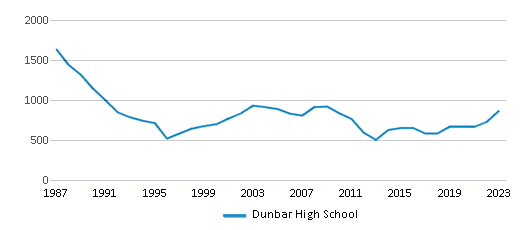
Gender %
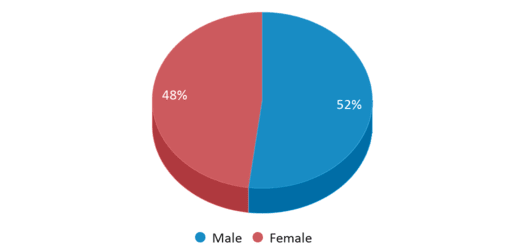
Total Classroom Teachers
76 teachers
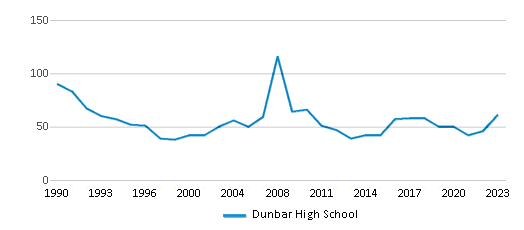
Students by Grade
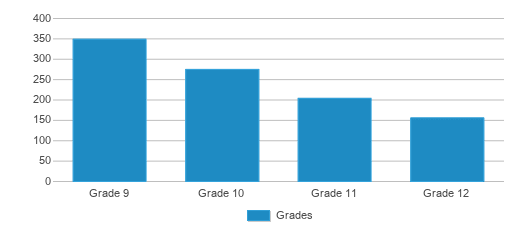
School Calendar
School Rankings
Dunbar High School ranks within the bottom 50% of all 220 schools in District Of Columbia (based off of combined math and reading proficiency testing data).
The diversity score of Dunbar High School is 0.20, which is less than the diversity score at state average of 0.55. The school's diversity has stayed relatively flat over five school years.
Overall Testing Rank
#192 out of 220 schools
(Bottom 50%)
(Bottom 50%)
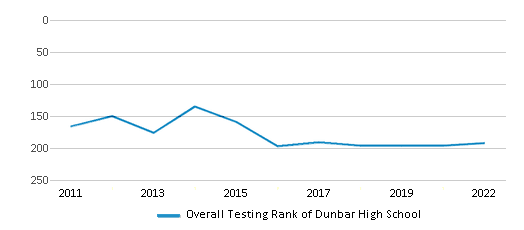
Math Test Scores (% Proficient)
≤1%
19%
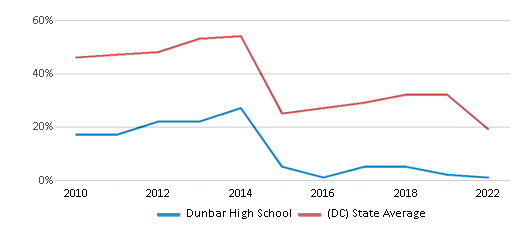
Reading/Language Arts Test Scores (% Proficient)
19%
31%
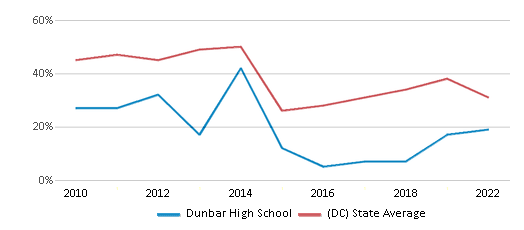
Science Test Scores (% Proficient)
≤1%
10%
Student : Teacher Ratio
13:1
11:1
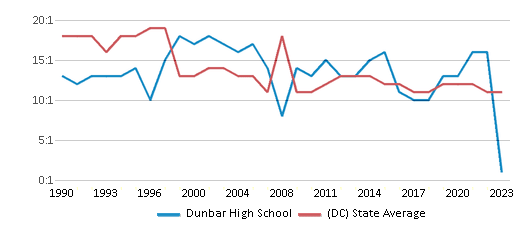
American Indian
n/a
n/a
Asian
1%
2%
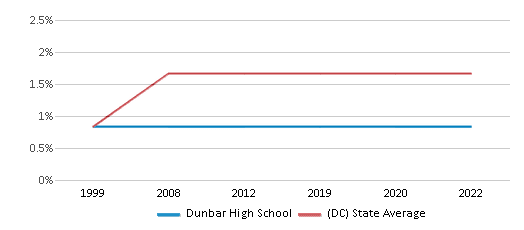
Hispanic
10%
19%
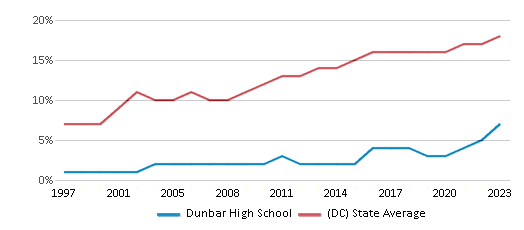
Black
89%
63%
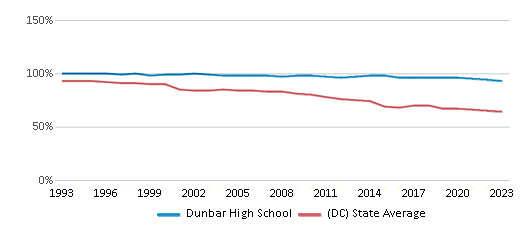
White
n/a
13%
Hawaiian
n/a
n/a
Two or more races
n/a
3%
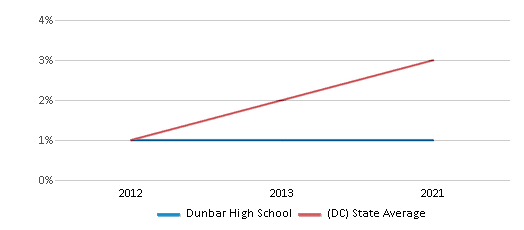
All Ethnic Groups
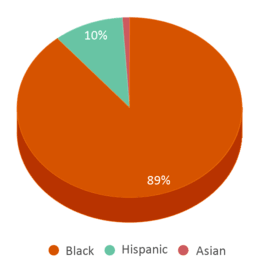
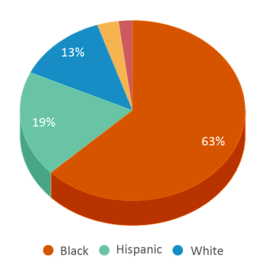
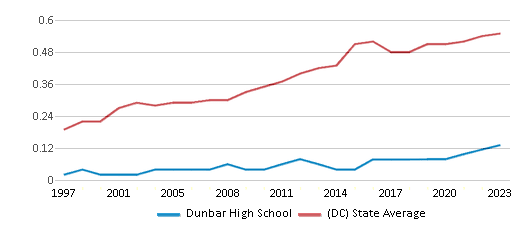
Graduation Rate
70-74%
76%
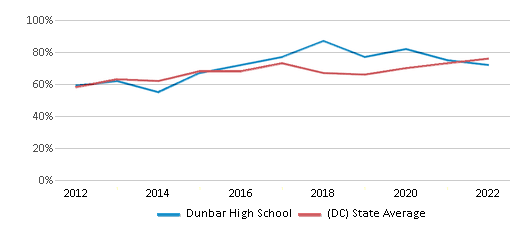
Participates in the National School Lunch Program (NSLP)
Yes
Eligible for Free Lunch
66%
49%
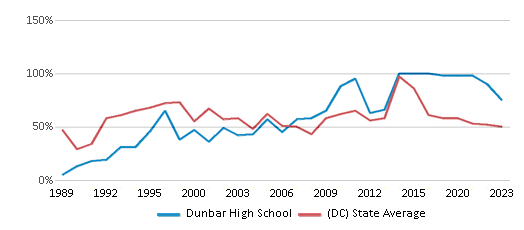
Eligible for Reduced Lunch (11-12)
5%
5%
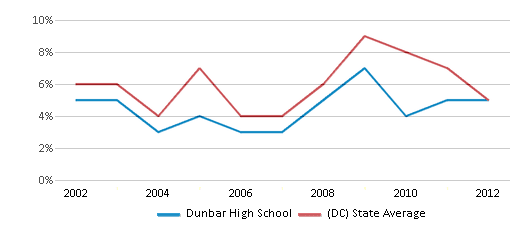
School Statewide Testing
School District Name
Source: National Center for Education Statistics (NCES), DC Dept. of Education
School Notes
- Dunbar High School is a public secondary school located in Washington, D.C., United States.
- Dunbar, which serves grades 9 through 12, is a part of the District of Columbia Public Schools.
- Dunbar was the first high school for black children. It was known for its excellent academics, enough so that many black parents would move to Washington specifically so their children could attend it. Its faculty was paid well by the standards of the time, earning parity pay to Washington's white school teachers. It also boasted a remarkably high number of graduates who went on to higher education, and a generally successful student body.
- Following desegregation and deconstruction of the original facility, its prestige dropped notably. As of 2006, the campus is situated in a newer, but far less architecturally appealing facility in Northwest Washington.
- Dunbar is perhaps best known for its athletic programs, and particularly its football team. Some of Dunbar's recent graduates have gone on to succeed in NCAA football and the NFL. Joshua Cribbs, who graduated in 2001, was the starting quarterback for four years at Kent State University and currently is a member of the Cleveland Browns. Vernon Davis,who graduated in 2003, was the number 6 pick in the 2006 NFL Draft and is now a tight end for the San Fransisco 49ers. Also a current Dunbar senior, wide receiver Arrelious Benn, is among the top college prospects in the nation.
- Notable Alumni: Notable graduates include:Charles Drew, Eleanor Holmes Norton, Senator Ed Brooke, Charles Hamilton Houston.
Profile last updated: 02/09/2025
Frequently Asked Questions
What is Dunbar High School's ranking?
Dunbar High School is ranked #192 out of 220 schools, which ranks it among the bottom 50% of public schools in District Of Columbia.
What schools are Dunbar High School often compared to?
Dunbar High Schoolis often viewed alongside schools like Mckinley Technology High School, H.d. Woodson High School by visitors of our site.
What percent of students have achieved state testing proficiency in math and reading?
≤1% of students have achieved math proficiency (compared to the 19% DC state average), while 19% of students have achieved reading proficiency (compared to the 31% DC state average).
What is the graduation rate of Dunbar High School?
The graduation rate of Dunbar High School is 70-74%, which is lower than the District Of Columbia state average of 76%.
How many students attend Dunbar High School?
984 students attend Dunbar High School.
What is the racial composition of the student body?
89% of Dunbar High School students are Black, 10% of students are Hispanic, and 1% of students are Asian.
What is the student:teacher ratio of Dunbar High School?
Dunbar High School has a student ration of 13:1, which is higher than the District Of Columbia state average of 11:1.
What grades does Dunbar High School offer ?
Dunbar High School offers enrollment in grades 9-12
What school district is Dunbar High School part of?
Dunbar High School is part of District Of Columbia School District.
In what neighborhood is Dunbar High School located?
Dunbar High School is located in the Northwest Washington neighborhood of Washington, DC. There are 74 other public schools located in Northwest Washington.
School Reviews
Review Dunbar High School. Reviews should be a few sentences in length. Please include any comments on:
- Quality of academic programs, teachers, and facilities
- Availability of music, art, sports and other extracurricular activities
Recent Articles

What Is A Charter School?
Explore the world of charter schools in this comprehensive guide. Learn about their history, how they operate, and the pros and cons of this educational innovation. Discover key facts about charter schools, including admission policies, demographics, and funding, as well as what to look for when considering a charter school for your child.

10 Reasons Why High School Sports Benefit Students
Discover the 10 compelling reasons why high school sports are beneficial for students. This comprehensive article explores how athletics enhance academic performance, foster personal growth, and develop crucial life skills. From improved fitness and time management to leadership development and community representation, learn why participating in high school sports can be a game-changer for students' overall success and well-being.

February 05, 2025
Understanding the U.S. Department of Education: Structure, Impact, and EvolutionWe explore how the Department of Education shapes American education, from its cabinet-level leadership to its impact on millions of students, written for general audiences seeking clarity on this vital institution.





